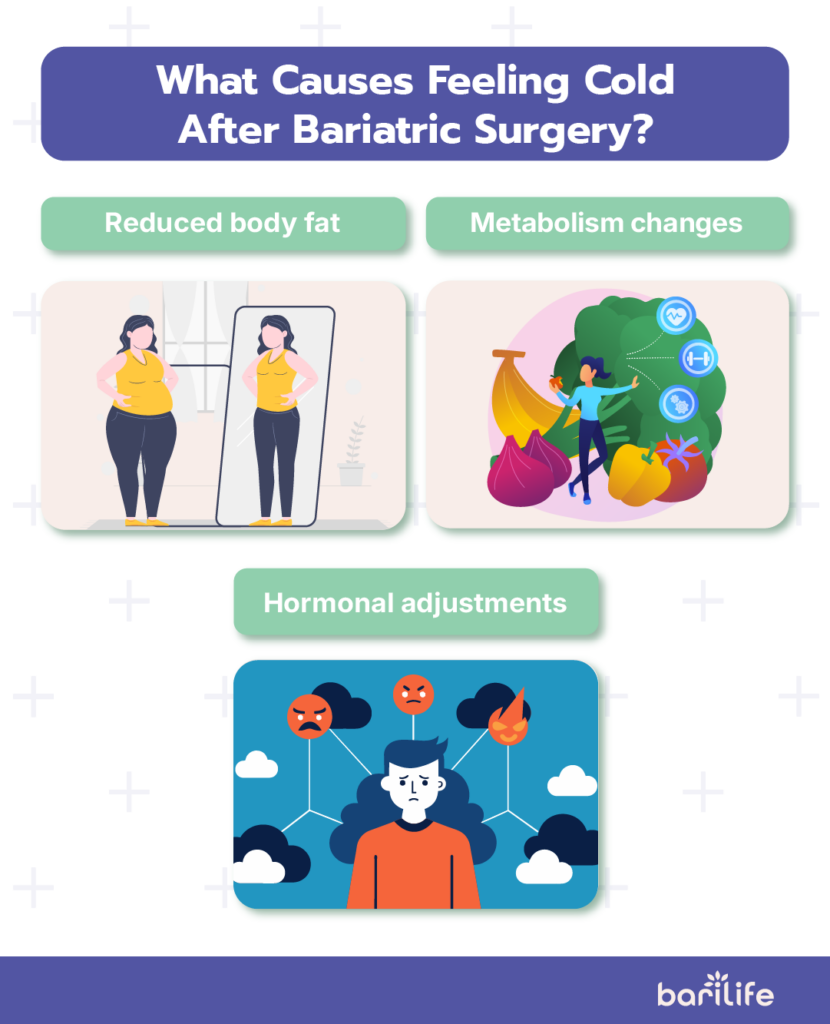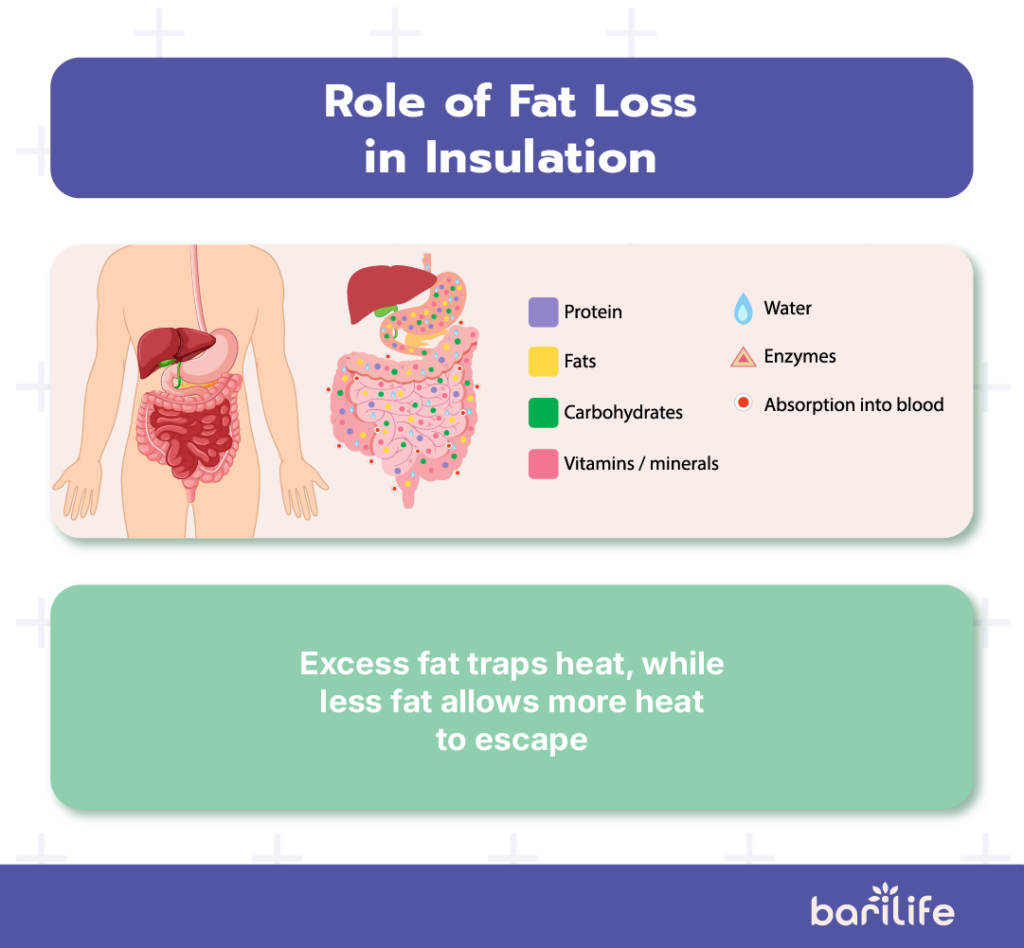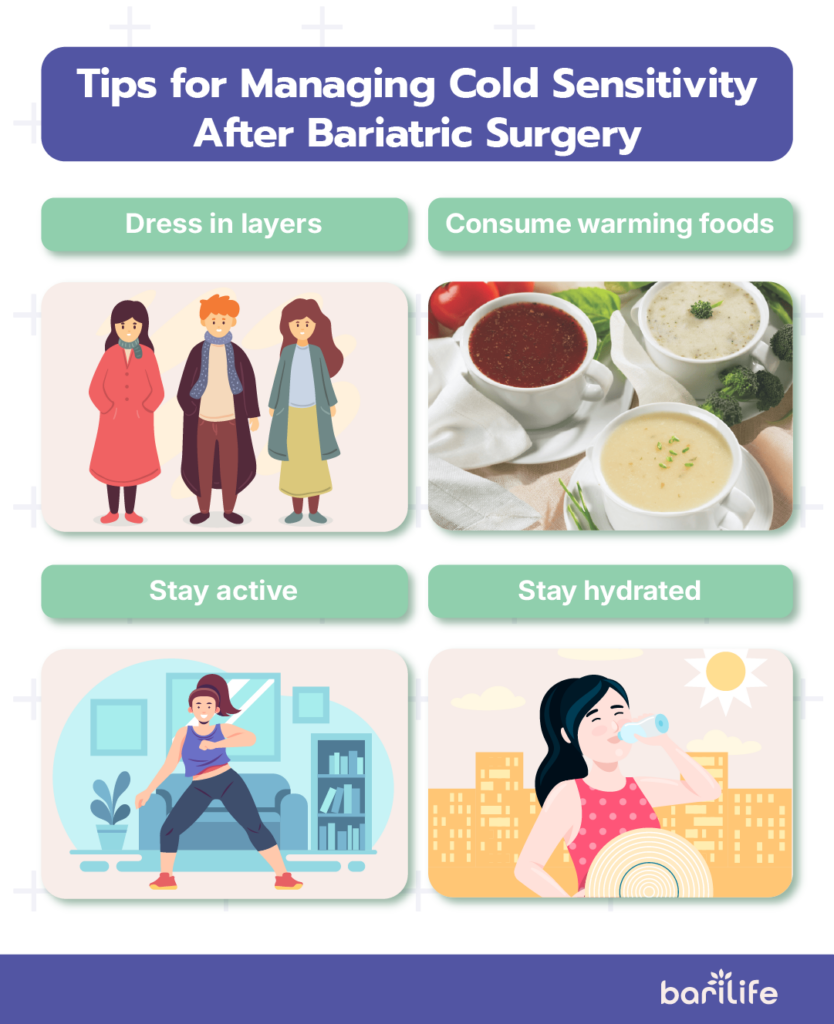Key Takeaways
- Weight loss after bariatric surgery reduces fat and slows metabolism, which can cause you to feel more cold.
- Hormonal changes and being low in certain nutrients can also impact your body’s ability to regulate temperature.
- Simple strategies like dressing in layers, consuming warm liquids and foods, and staying active can help boost your body’s heat.
If you’ve recently had bariatric surgery and find yourself constantly reaching for a sweater, you’re not alone.
Feeling cold all the time is a common, but sometimes unexpected, side effect of significant weight loss after bariatric surgery. However, a balanced intake of nutrients like bariatric vitamins or even trying liquid bariatric vitamin formulations can help ease the adjustment. But don’t worry, it’s natural to be more chilly, and it should improve over time.
So snuggle up with a cozy blanket and explore why you are colder after bariatric surgery and how you can warm up.
Table of Contents
What Causes Feeling Cold After Bariatric Surgery?

After bariatric surgery, your body undergoes several changes that may make you feel like you are living in an ice box. Here are several reasons why.
- Reduced body fat: Fat acts like insulation for your body. When you lose significant weight, your insulation layer thins out, making it harder for your body to stay warm.
- Metabolism changes: After surgery, your metabolism may slow down, reducing the calories your body burns each day. Burning fewer calories decreases the internal heat your body naturally makes.
- Hormonal adjustments: Several hormones, such as your thyroid hormones, can change after bariatric surgery. These hormones play a role in temperature regulation, which can cause you to feel colder.
How Weight Loss Affects Body Temperature Regulation
Thermogenesis is a fancy word that describes how your body generates heat. Fat and muscle are major sources of energy your body uses to produce heat.
After bariatric surgery, when your fat stores and sometimes your muscles decrease, your body struggles to produce and retain warmth.
Also, significant weight loss tends to lower your basal metabolic rate (BMR). Your BMR is how many calories your body burns at rest. A reduced BMR means your body produces less heat overall, making you reach for that sweater or blanket.
Interestingly, weight loss can improve circulation as your blood vessels no longer have to work as hard to pump blood through the extra weight. While this benefits overall health, it doesn’t translate to feeling warmer. The reduced insulation (fat) around your blood vessels can still make you more susceptible to colder temperatures.
You may notice increased cold sensitivity due to nutritional deficiencies that are common after surgery. Incorporating bariatric protein shakes and bariatric multivitamins into your diet can help combat some of these deficiencies, improving energy and thermoregulation.
Role of Fat Loss in Insulation
Fat plays an important role in keeping your body warm by acting as a natural insulator.
When you have excess fat, it keeps your body warmer by trapping your internal heat. With less fat, your internal heat can escape more easily.
Less fat also makes you more vulnerable to the air temperatures around you.

Impact of Reduced Caloric Intake on Metabolism and Heat Production
Reducing calorie intake can also impact your body temperature and internal heat production. The act of breaking down calories in your body produces heat. With fewer calories to burn, there is less heat.
Some people feel cold when they don’t eat. This is because digesting food helps heat your body. Because you are eating less food after bariatric surgery, you may tend to feel more chilly. This can also affect blood sugar levels after bariatric surgery, leading to periods of cold sensitivity due to fluctuating energy levels.
Nutritional Deficiencies and Cold Sensitivity
Several nutritional deficiencies and health conditions can also cause you to feel more cold.
- Iron deficiency: Iron is essential for transporting oxygen throughout the body, which is crucial for generating heat. Low iron levels can lead to increased cold sensitivity.
- Low thyroid function: Insufficient levels of nutrients like iodine and selenium can impair thyroid function. A sluggish thyroid can reduce the body’s ability to produce heat, making you feel colder.
- Vitamin B12 and folate deficiency: These vitamins play a key role in energy metabolism. Deficiencies can lower your metabolic rate and decrease heat production, leading to a constant feeling of coldness.
Tips for Managing Cold Sensitivity After Bariatric Surgery
Feeling cold all the time can be frustrating. Here are some practical ways to stay warm and comfortable as your body adjusts.
- Dress in layers: Wearing multiple thin layers is more effective at trapping heat than a single thick layer. Opt for thermal shirts, wool socks, and cozy sweaters to help maintain your body temperature.
- Consume warming foods: Eat foods that can boost thermogenesis, such as ginger, spicy peppers, cinnamon, and even bariatric snacks. Protein-rich meals can also increase metabolism and generate more heat.
- Drink warm liquids: Enjoy hot beverages like tea, coffee, or broth to warm up from the inside out.
- Stay active: Physical activity helps increase blood flow and generate body heat. Even light exercises like brisk walking or stretching can help boost circulation and keep you warm.

- Stay hydrated: Dehydration can lower your body’s ability to regulate temperature, so drink plenty of fluids throughout the day.
- Use heating aids: Electric blankets, heating pads, or warm baths can provide immediate warmth and help raise your body temperature. Hand warmers or heated socks can also be helpful for particularly cold hands and feet.
- Talk with your doctor: Let your healthcare provider know you frequently feel cold. They can test you for nutritional deficiencies or other conditions that may contribute to cold sensitivity.
Conclusion
Feeling cold is a common and often surprising side effect of bariatric surgery. It typically has to do with the loss of your natural insulation—fat. More of your internal heat can escape, causing you to feel more chilled.
Changes to your metabolism and hormones can also affect your body’s ability to produce and retain heat. Additionally, periods of a weight stall after bariatric surgery might coincide with frustrating symptoms like cold sensitivity as your body readjusts to caloric intake and metabolic changes.
While this newfound chilliness can be uncomfortable, it’s typically a normal part of your body’s adjustment process.
You can stay warm by dressing in warm layers, staying active, and sipping on warm liquids throughout the day. As your body settles into its new weight, the constant chill should improve.
If you ever have concerns about persistent cold sensitivity, check in with your healthcare provider to ensure everything is on track.
If you want to learn more, why not check out these articles below:
- Hair Loss after Bariatric Surgery
- Bad Breath after Bariatric Surgery
- Fatty Liver Bariatric Surgery
- Weight Gain after Bariatric Surgery
- How To Keep from Looking Old after Bariatric Surgery?
- Elevated AST and ALT after Bariatric Surgery
References
Hypothalamic dysfunction. (2023). MedlinePlus.
Ossila, E., et al. (2023). Physiology, Temperature Regulation. StatPearls.
Speakman, JR., ((2018). Obesity and thermoregulation. Handb Clin Neurol.
Why do I feel so cold all the time? (2022). Harvard Health Publishing.
Yousef, H., et al. (2023). Physiology, Thermoregulation. StatPearls.




What are your tips and tricks to post-bariatric success?